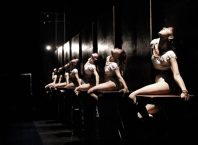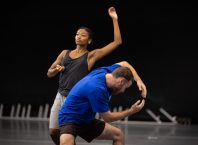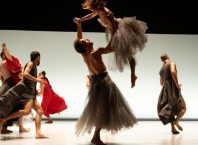“I’m their child, “said Talia Beck of Inbal Pinto and Avshalom Pollak, with whom she has worked since their accidental meeting in Belgium seven years ago when Beck auditioned for Wim Vandekebus and ended up becoming a dancer in the Inbal Pinto Company that was rehearsing next door. “They know how to give me what I myself don’t yet know that I want,” said Beck, whose first choreographic work, “Saudade” shares the stage this coming weekend with the Pinto/Pollak/Barnett collaboration “Rushes” at the Suzanne Dellal Center in Tel Aviv.
Beck’s modest demeanor gives little intimation of the dancer’s graceful elegance, fierce intensity and surprising comic range. Her artistic family has not only been warm and nurturing, but encouraged her to seek her own path. Pinto and Pollak did not even see “Saudade” until a very late stage in the creative process, enabling the introspective Beck to develop her own stage language from very private, personal materials.
“Saudade” (a Portuguese word which means something beyond sadness, a longing for that which no longer exists, a desire for something which perhaps may never have existed at all) is an intimate work that explores memory itself, poetic in its allusive imagery. Simple elements evoke a sense of mystery. A large dining table and four tall chairs, five women in white dresses evocative of another era, a water basin and white feathers signal that the work exists in the realm of the symbolic.
“I think my piece may feel very different for the Pinto/Pollak audience,” says Beck. Yet in many ways, it is a work that has emerged entirely from the company itself. The dancers are all from the company, some dancing together for several years. Beck emphasizes the collaborative aspect of her work with the dancers as they explored their own memories and integrated their presence within the work. While the imagery and movement language is distinct, there is clearly an affinity in work methods: the attention to detail and willingness to embark on a journey to an unknown creative destination bear the Pinto/Pollak mark.
The journey to “Saudade” was preceded by another exploration – the encounter with Robby Barnett and the Pilobolus Dance Theater which resulted in “Rushes”. Founded in 1971, Pilobolus is known for their acrobatic physicality, creating images and situations with their bodies, slightly surreal and often humorous. The first meeting of the two companies at Barnett’s invitation was a step into the unknown for both – neither had ever worked with a guest choreographer and they each have their own distinctive style. Pinto, recalling that first encounter says, “It was an experiment. We tried to understand how things work, whether it could work at all. The beginning was not simple. It took time to understand this Pilobolus body.”
Arriving with two dancers from their own company, Beck and Andreas Merk, they spent ten days together in what Pinto describes as “Pilobolus village”, learning one another’s language. Based in Connecticut, far from the urban noise and grit that is the backdrop to the Pinto Company studios, the members of Pilobolus spend eight months of the year together, working, performing and touring. “It’s a live organism,” says Pinto, “the dancers are an active part of the creation, and they are the life of the place.” Founder Robby Barnett has developed a distinctive language and style of work, inspired by nature and transcending physical boundaries. The dancers learn this language, as Pinto describes it, they learn to “dress Pilobolus”, and it becomes their own. Pinto says of her work with Pilobolus dancers, “You can throw them a ball, paper, nothing – and they go with it. They come to life through being together.”
It is perhaps this intimacy; the familial feeling combined with a willingness to explore embodied by both companies that enabled them to find a common bond, a way of working together to create something new in the studio. Pinto reflects on the process: “Each work is a kind of search, escape, encountering myself. In collaboration I discover things that I would not have found on my own.” She describes the strong connection of the Pilobolus Company to nature, her sense of the artifacts in Barnett’s house as representing that bond through “images of nature that are connected to the body. A tree branch that might look like an arm…they see the body as a wonder of nature, and they are like children looking at this wonder, in awe and amazement. I also feel a little bit like a child who is looking for a box of surprises that I can open and enter within. A kind of attic…you enter, each time discovering another niche that you have not yet explored.”
“Rushes”, the work that resulted from the Pinto/Pollak/Barnett collaboration, was first performed by the Pilobolus Company, who appeared with it in Israel as well. Currently performed by the Inbal Pinto Company, its acrobatic physicality presents the male dancers with physical challenges that Beck says “they are enjoying very much.” Describing the differences in movement language between the companies, Beck says, “we work from details that come together to create a world, they work according to a particular line. We are interested in the individuals and they have one flow of movement created by five people.” The dialogue between the two companies is evident in the work, and it is intriguing to see the Pinto dancers move in a way that is recognizably Pilobolus, yet Pinto/Pollak.
While the Inbal Pinto Company performs “Rushes” in Tel Aviv, Avshalom Pollak is back in Connecticut, creating a new work with the Pilobolus dancers. The process of dialogue and discovery is ongoing, with both companies learning and being inspired by one another. Each project presents its own new adventure – in the current process, Pinto and Pollak are creating together on different continents as Pinto is in her ninth month of pregnancy and cannot travel. As she says, “It’s a little hallucinatory to do this over the internet. I am somewhat outside and looking from a distance.” Yet this different perspective enables her to view the process itself, and observe Pollak’s work with the dancers as he conveys the way that the Pinto Company engages with the work on an individual, emotional level. Pinto says, “It [the difference between the companies] falls exactly on the place of emotion – to understand that its enough that I stand right here and experience this feeling.”
Image credit: Gadi Dagon
Performances:
Thursday, April 23 at 21:00
Friday, April 24 at 14:00 and 22:00
Saturday, April 25 at 21:00
Suzanne Dellal Center
5 Yehieli St. Neve Tzedek
Tel Aviv
Tickets: 03-5105656
www.suzannedellal.org.il






Comments are closed.